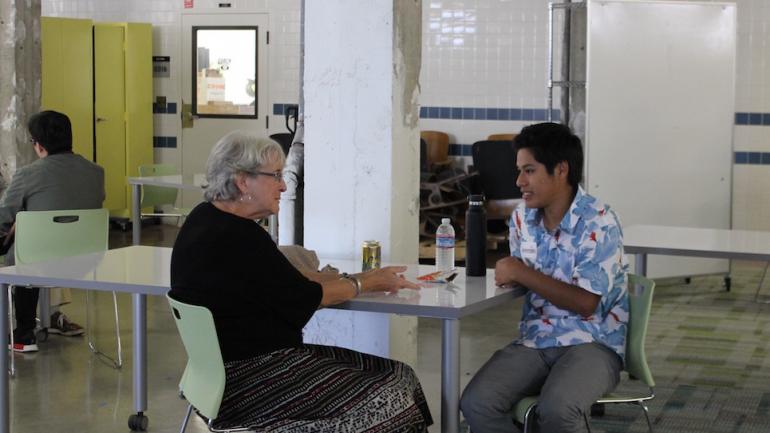
“Individual and societal success depends on educating young people to be empathetic,” said Anne Kenner, Humanities Teacher at Gateway High School, current member of Stanford’s Center on Longevity Advisory Council, and a 2016 and 2017 Fellow at Stanford’s Distinguished Careers Institute. “When young people develop empathy, they not only thrive in school and adult life, but they also become leaders who have the ability to make an extraordinary impact on their community.”
Empathy, at its simplest, is the ability to read the environment, understand and share the feelings of another, and respond. It is how we as individuals understand what others are experiencing as if we were feeling it ourselves. Yet research shows that there has been a drop in empathetic concern for others over the past few decades, possibly due to social networking, increased screen time, and decreased face-to-face relationships.
With leadership from Kenner, Gateway has piloted an empathy-based leadership curriculum this semester to teach students to understand and process multiple and conflicting points of views as a way to achieve prosocial skills such as determination, grit, drive, and effective leadership.
“The curriculum offers students a leadership ‘toolkit’ that uses empathy as a vehicle for effective and informed problem solving,” according to Kenner. “Essentially, students are asked to build leadership solutions by learning how to think with, rather than for, others.”
During the first part of the semester, through a series of readings, activities, assignments, and debates, students learned about empathy, explored whether empathy is truly declining among their millennial peers, and learned skills that will help them empathetically look at, listen to, and question about the world around them.
“During the first part of the semester, I was able to learn skills that I can use in everyday life like asking open ended questions, making eye contact, and truly listening to what another person has to say even if their opinion is different from mine,” said Assata G, 11th grade student.
During the second part of the semester, students focused on “big issues” of the 21st century that will require leadership from their generation, which include poverty and inequality, longevity, fake news, and the opioid epidemic. Students examined each issue from multiple and competing perspectives, and heard from various community leaders who work in these spaces and who volunteered to share their expertise and experience with students.
For their final assignment in each “big issue” unit students developed a “first step solution” to the challenges and opportunities presented by that issue. “‘First step solutions’ are not global solutions; rather, they are everyday actions or behaviors that ordinary people can adopt to build awareness and set an example for prosocial change,” said Kenner.
In the longevity context, for example, students were asked to develop “first step solutions” for the problems of isolation and loneliness among older adults. To scaffold this process, students participated in a two-day intensive workshop with Sages and Seekers where students met with, interviewed, and learned first-hand from older adults about the upsides and challenges they experience during the aging process.
“The longevity class was pretty lit (definition for those not in high school: fun, cool),” said Jeremy R, 11th grade student. “I learned how important it is to keep good relationships throughout my life and spoke to the older person I met with about mountain biking.”
Resulting “first step solutions” included outreach to the older adult with whom the student was paired with and volunteering at a senior center close to school or home.
By the end of the semester, Kenner hopes students will have achieved effective and successful decision making skills, moral and character growth, and a sense of agency and purpose.
Kenner regularly asks her students to provide feedback on whether or not the curriculum is working for them. With the support of Gateway, she hopes to make the curriculum scalable and provide even more deserving students with the opportunity to build leadership skills through empathy.
“It takes an incredibly supportive, innovative, and open environment to pilot a curriculum like this and Gateway is just that,” said Kenner. “Everyone in the Gateway community has pitched in to make this class work and I am so thankful that they were interested in developing this curriculum with me. Gateway is truly a trailblazer.”